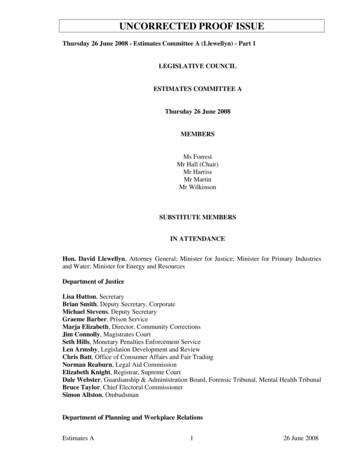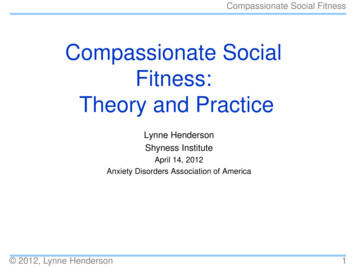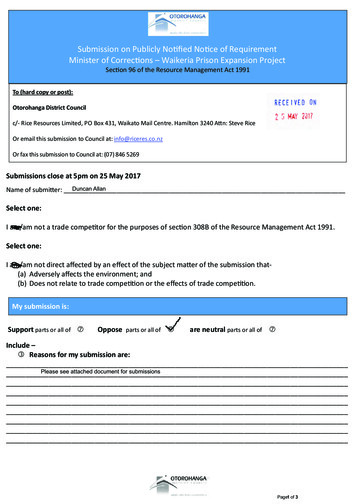
Transcription
TheMinister’sSelf-WatchCharles H. Spurgeon (1834-1892)
THEMINISTER’SSELF-WATCHby Charles H. Spurgeon (1834-1892)Contents1. Introduction . 32. The Minister Should Be a Saved Man. . 53. The Minister’s Piety Should Be Vigorous. . 94. The Minister’s Personal Character Should Agree with His Ministry. . 13The Minister’s Self-Watch is the first chapter in Charles Spurgeon’s Lectures to My Students. Spurgeon’sLectures contains great wisdom and advice for preachers. He addressed the Lectures to students at thePastor’s College, a college Spurgeon instituted because he recognized the need for training pastors forthe Gospel ministry. In fact, he called the college his “first-born and best beloved.” He also said, “Thisis my life’s work, to which I believe God has called me and therefore I must do it. To preach the Gospelmyself, and to train others to do it, is my life’s object and aim.” The Pastor’s College trained hundredsof men during Spurgeon’s lifetime.Many footnotes are abstracted from www.wikipedia.com.
Copyright 1999 Chapel Library: annotations. Published in the USA. Permission is expressly grantedto reproduce this material by any means, provided1. you do not charge beyond a nominal sum for cost of duplication2. this copyright notice and all the text on this page are included.Chapel Library is a faith ministry that relies entirely upon God’s faithfulness. We therefore do not solicit donations, but we gratefully receive support from those who freely desire to give. Chapel Librarydoes not necessarily agree with all doctrinal positions of the authors it publishes.Worldwide, please download material without charge from our website, or contact the internationaldistributor as listed there for your country.In North America, for additional copies of this booklet or other Christ-centered materials from priorcenturies, please contactCHAPEL LIBRARY2603 West Wright StreetPensacola, Florida 32505 USAPhone: (850) 438-6666 Fax: (850) 438-0227chapel@mountzion.org www.ChapelLibrary.org2
THEMINISTER’SSELF-WATCH“Take heed unto thyself, and unto the doctrine.”—1 Timothy 4:161. IntroductionEworkman knows the necessity of keeping his tools in a good state of repair,for “if the iron be blunt, and he does not whet the edge, then must he put to morestrength.” If the workman lose the edge from his axe, he knows that there will be agreater draught upon his energies, or his work will be badly done. Michaelangelo, 1 theelect of the fine arts, understood so well the importance of his tools, that he always madehis own brushes with his own hands, and in this he gives us an illustration of the God ofgrace, Who with special care fashions for Himself all true ministers. It is true that theLord, like Quintin Matsys in the story of the Antwerp well-cover, 2 can work with thefaultiest kind of instrumentality, as He does when He occasionally makes very foolishpreaching to be useful in conversion; and He can even work without agents, as He doeswhen He saves men without a preacher at all, applying the Word directly by His HolySpirit; but we cannot regard God’s absolutely sovereign acts as a rule for our action. HeVERY1Michaelangelo (1475-1564) – Italian Renaissance painter, sculptor, architect, poet, and engineer. Hisversatility in the disciplines he took up was of such a high order that he is often considered a contender for the title of the archetypal “Renaissance man.”2Quintin Matsys (1466-1530) – painter in the Flemish tradition and a founder of the Antwerp school.He was born at Leuven, where he first was trained as an ironsmith. Near the front of the Cathedral ofOur Lady in Antwerp is a wrought-iron well, known as the “Matsys Well,” which according to tradition was made by the painter-to-be.3
may, in His own absoluteness, do as pleases Him best, but we must act as His plainerdispensations instruct us; and one of the facts which is clear enough is this, that theLord usually adapts means to ends, from which the plain lesson is that He shall be likelyto accomplish most when we are in the best spiritual condition—or in other words, weshall usually do our Lord’s work best when our gifts and graces are in good order, andwe shall do worst when they are most out of trim. This is a practical truth for our guidance; when the Lord makes exceptions, they do but prove the rule.We are, in a certain sense, our tools, and therefore must keep ourselves in order. If Iwant to preach the Gospel, I can only use my own voice; therefore I must train my vocalpowers. I can only think with my own brains, and feel with my own heart, and thereforeI must educate my intellectual and emotional faculties. I can only weep and agonize forsouls in my own renewed nature, therefore must I watchfully maintain the tendernesswhich was in Christ Jesus. It will be in vain for me to stock my library, or organize societies, or project schemes, if I neglect the culture of myself—for books, agencies, and systems are only remotely the instruments of my holy calling. My own spirit, soul, and bodyare my nearest machinery for sacred service; my spiritual faculties, and my inner life, aremy battle axe and weapons of war. M’Cheyne, 3 writing to a ministerial friend who wastraveling with a view to perfecting himself in the German tongue, used language identical to our own: “I know you will apply hard to German, but do not forget the culture ofthe inner man—I mean of the heart. How diligently the cavalry officer keeps his sabreclean and sharp; every stain he rubs off with the greatest care. Remember you are God’ssword, His instrument, I trust, a chosen vessel unto Him to bear His name. In greatmeasure, according to the purity and perfection of the instrument, will be the success. Itis not great talents God blesses so much as likeness to Jesus. A holy minister is an awfulweapon in the hand of God.”For the herald of the Gospel to be spiritually out of order in his own proper person is,both to himself and to his work, a most serious calamity; and yet, my brethren, how easily is such an evil produced, and with what watchfulness must it be guarded against!Traveling one day by express from Perth to Edinburgh, on a sudden we came to a deadstop, because a very small screw in one of the engines—every railway locomotive consisting virtually of two engines—had been broken, and when we started again we wereobliged to crawl along with one piston-rod at work instead of two. Only a small screwwas gone—if that had been right, the train would have rushed along its iron road—butthe absence of that insignificant piece of iron disarranged the whole. A train is said tohave been stopped on one of the United States’ railways by flies in the grease-boxes of thecarriage wheels. The analogy is perfect; a man in all other respects fitted to be useful,may by some small defect be exceedingly hindered, or even rendered utterly useless.3Robert Murray M’Cheyne (1813-1843) – (sometimes written “McCheyne”) Scottish Presbyterianminister of St. Peter’s Church, Dundee. A godly evangelical pastor and evangelist with a great lovefor souls, whose ministry was marked by deep personal holiness, prayer, and powerful evangelicalpreaching. Born in Edinburgh, Scotland.4
Such a result is all the more grievous, because it is associated with the Gospel, which inthe highest sense is adapted to effect the grandest results.It is a terrible thing when the healing balm loses its efficacy through the blundererwho administers it. You all know the injurious effects frequently produced upon waterthrough flowing along leaden pipes; even so the Gospel itself, in flowing through menwho are spiritually unhealthy, may be debased until it grows injurious to their hearers.It is to be feared that Calvinistic 4 doctrine becomes a most evil teaching when it is setforth by men of ungodly lives, and exhibited as if it were a cloak for licentiousness; 5 andArminianism,6 on the other hand, with its wide sweep of the offer of mercy, may do mostserious damage to the souls of men, if the careless tone of the preacher leads his hearersto believe that they can repent whenever they please, and that, therefore, no urgencysurrounds the Gospel message.Moreover, when a preacher is poor in grace, any lasting good which may be the resultof his ministry, will usually be feeble and utterly out of proportion with what might havebeen expected. Much sowing will be followed by little reaping; the interest upon the talents will be inappreciably small. In two of three of the battles which were lost in the lateAmerican war, the result is said to have been due to the bad gunpowder which wasserved out by certain “shoddy” contractors to the army, so that the due effect of a cannonade was not produced. So it may be with us. We may miss our mark, lose our endand aim, and waste our time, through not possessing true vital force within ourselves, ornot possessing it in such a degree that God could consistently bless us. Beware of being“shoddy” preachers.2. The Minister Should Be a Saved Man.It should be one of our first cares that we ourselves be saved men. That a teacher ofthe Gospel should first be a partaker of it is a simple truth, but at the same time a rule ofthe most weighty importance. We are not among those who accept the apostolical succession of young men simply because they assume it; if their college experience has beenrather vivacious than spiritual, if their honors have been connected rather with athleticexercises than with labours for Christ, we demand evidence of another kind than theyare able to present to us. No amount of fees paid to learned doctors, and no amount ofclassics received in return, appear to us to be evidences of a call from above. True andgenuine piety is necessary as the first indispensable requisite; whatever “call” a man may4Calvinistic – pertaining to the doctrine taught by John Calvin (1509-1564), which became fundamental to the Protestant Reformation. It holds that God sovereignly rules over all things, including thesalvation of men by giving them the gifts of repentance and faith.5licentiousness – lewdness; inclined to lust; preoccupied with lustful desires.6Arminianism – the system of doctrine taught by Jacobus Arminius (1560-1609), Dutch theologian,born in Oudewater, the Netherlands. He rejected the Reformers’ understanding of salvation by God’ssovereign election, teaching instead that God’s election of individuals was based on His foreknowledge of their accepting or rejecting Christ by their own free will.5
pretend to have, if he has not been called to holiness, he certainly has not been called tothe ministry.“First be trimmed thyself, and then adorn thy brother,” say the rabbis. “The hand,”saith Gregory, 7 “that means to make another clean, must not itself be dirty.” If your saltbe unsavory how can you season other? Conversion is a sine quanon 8 in a minister. Yeaspirants to our pulpits: “ye must be born again” (Joh 3:7). Nor is the possession of thisfirst qualification a thing to be taken for granted by any man, for there is very great possibility of our being mistaken as to whether we are converted or not. Believe me, it is nochild’s play to “make your calling and election sure” (2Pe 1:10). The world is full ofcounterfeits, and swarms with panderers to carnal self-conceit, who gather around aminister as vultures around a carcass. Our own hearts are deceitful, so that truth lies noton the surface, but must be drawn up from the deepest well. We must search ourselvesvery anxiously and very thoroughly, lest by any means after having preached to otherswe ourselves should be castaways (1Co 9:27).How horrible to be a preacher of the Gospel and yet to be unconverted! Let each manhere whisper to his own inmost soul, “What a dreadful thing it will be for me if I shouldbe ignorant of the power of the truth which I am preparing to proclaim!” Unconvertedministry involves the most unnatural relationships. A graceless pastor is a blind manelected to a professorship of optics, philosophizing upon sight and vision, discoursingupon and distinguishing to others the nice shades and delicate bleedings of the prismaticcolours, while he himself is absolutely in the dark! He is a dumb man elevated to thechair of music; a deaf man fluent upon symphonies and harmonies! He is a mole profess9ing to educate eaglets; a limpet elected to preside over angels. To such a relationshipone might apply the most absurd and grotesque metaphors, except that the subject is toosolemn. It is a dreadful position for a man to stand in, for he has undertaken work forwhich he is totally, wholly, and altogether unqualified, but from the responsibilities ofwhich this unfitness will not screen him, because he willfully incurred them. Whateverhis natural gifts, whatever his mental powers may be, he is utterly out of court for spiritual work if he has no spiritual life; and it is his duty to cease the ministerial office tillhe had received this first and simplest of qualifications for it.Unconverted ministry must be equally dreadful in another respect. If the man has nocommission, what a very unhappy position for him to occupy! What can he see in theexperience of his people to give him comfort? How must he feel when he hears the criesof penitents, or listens to their anxious doubts and solemn fears? He must be astonished7Gregory, Pope Gregory I (c. 540-604): Pope of the Roman Catholic Church from 590 until his death.Gregory is well-known for his writings, which were more prolific than those of any of his predecessors as pope. He was the first of the popes to come from a monastic background. Gregory is one of thesix Latin Fathers in church history. He is considered a saint in the Roman Catholic Church and theEastern Orthodox Church. Immediately after his death, Gregory was canonized by popular acclaim.John Calvin admired Gregory and declared in his Institutes that Gregory was the last “good” pope.8sine quanon – Latin: absolute prerequisite.9limpet – a mollusk with a cone-shaped shell, which strongly fastens itself to rocks or timbers in thewater—hence, a lowly creature.6
to think that his words should be owned to that end! The word of an unconverted manmay be blessed to the conversion of souls, since the Lord, while he disowns the man, willstill honour His own truth. How perplexed such a man must be when he is consultedconcerning the difficulties of mature Christians! In the pathway of experience, in whichhis own regenerate hearers are led, he must feel himself quite at a loss. How can he listen to their death-bed joys, or join in their rapturous fellowships around the table oftheir Lord?In many instances of young men put to a trade which they cannot endure, they haverun away to sea sooner than follow an irksome business; but where shall that man fleewho is apprenticed for life to the holy calling, and yet is a total stranger to the power ofgodliness? How can he daily bid men come to Christ, while he himself is a stranger tohis dying love? O sirs, surely this must be perpetual slavery. Such a man must hate thesight of a pulpit as much as a galley-slave hates the oar. And how unserviceable such aman must be. He has to guide travelers along a road of which he has never trodden, tonavigate a vessel along a coast of which he knows none of the landmarks! He is called toinstruct others, being himself a fool. What can he be but a cloud without rain, a treewith leaves only (Jude 12). As when the caravan in the wilderness, all athirst and ready todie beneath the broiling sun, comes to the long desired well, and, horror of horrors!finds it without a drop of water (Num 20). So when souls thirsting after God come to agraceless ministry, they are ready to perish because the water of life is not to be found.Better abolish pulpits than fill them with men who have no experimental knowledge ofwhat they teach.Alas! the unregenerate pastor becomes terribly mischievous too, for of all the causeswhich create infidelity, ungodly ministers must be ranked among the first. I read theother day, that no phase of evil presented so marvelous a power for destruction, as theunconverted minister of a parish, with a 1200 organ, a choir of ungodly singers, and anaristocratic congregation. It was the opinion of the writer, that there could be no greaterinstrument for damnation out of hell than that!People go to their place of worship and sit down comfortably, and think they must beChristians, when all the time all that their religion consists in, is listening to an orator,having their ears tickled with music, and perhaps their eyes amused with graceful actionand fashionable manners; the whole being no better than what they hear and see at theopera—not so good, perhaps, in point of aesthetic beauty, and not an atom more spiritual. Thousands are congratulating themselves, and even blessing God that they are devoutworshippers, when at the same time they are living in an unregenerate Christless state,having the form of godliness, but denying the power thereof. He who presides over a system which aims at nothing higher than formalism, 10 is far more a servant of the devilthan a minister of God.A formal preacher is mischievous while he preserves his outward equilibrium, but ashe is without the preserving balance of godliness, sooner or later he is almost sure to10formalism – for more on this, see Formality, a sermon by J.C. Ryle (1816-1900), reprinted by andavailable from Chapel Library.7
make a slip in his moral character—and what a position is he in then! How is God blasphemed, and the Gospel abused!Terrible is it to consider what a death must await such a man! and what must be hisafter-condition! The prophet pictures the king of Babylon going down to hell, and all thekings and princes whom he had destroyed, and whose capitals he had laid waste, risingup from their places in Pandemonium, and saluting the fallen tyrant with the buttingsarcasm, “Art thou become like unto us?” (Isa 14:10). And cannot you suppose a manwho has been a minister, but who has lived without thirst in his heart, going down tohell, and all the imprisoned spirits who used to hear him, and all the ungodly of his parish rising up and saying to him in bitter tones, “Art thou also become as we are? Physician, didst thou not heal thyself? Art thou who claimed to be a shining light cast downinto darkness for ever?” Oh! if one must be lost, let it not be in this fashion! To be lostunder the shadow of a pulpit is dreadful, but how much more so to perish from the pulpit itself!There is an awful passage in John Bunyan’s 11 treatise entitled Sighs from Hell, whichfull often rings in my ears: “How many souls have blind priests been the means of destroying by their ignorance? Preaching that was no better for their souls than rats baneto the body. Many of them, it is to be feared, have whole towns to answer for. Ah! friend,I tell thee, thou that hast taken in hand to preach to the people; it may be thou hast taken in hand thou canst not tell what. Will it not grieve thee to see the whole parish comebellowing after thee into hell? crying out, ‘This we have to thank thee for, thou wastafraid to tell us of our sins, lest we should not put meat fast enough into thy mouth. Ocursed wretch, thou wast not content, blind guide as thou wast, to fall into the ditch thyself, but hast also led us thither with thee!”Richard Baxter, 12 in his Reformed Pastor, amid much other solemn matter, writes asfollows.“Take heed to yourselves lest you should be void of that saving grace of God whichyou offer to others, and be stranger to the effectual working of that Gospel which youpreach; and lest, while you proclaim the necessity of a Saviour to the world, yourhearts should neglect Him, and you should miss of an interest in Him and His savingbenefits. Take heed to yourselves, lest you perish while you call upon others to takeheed of perishing, and lest you famish yourselves while you prepare their food.Though there be a promise of shining as stars to those that turn any to righteousness(Dan 12:3), this is but on supposition that they be first turned to it themselves: suchpromises are made caeteris aribus, et suppositis supponendis. Their own sincerity in11John Bunyan (1628-1688) – English minister, preacher, and one of the most influential writers of the17th century. Beloved author of The Pilgrim’s Progress, The Holy War, The Acceptable Sacrifice, andnumerous others. Born at Elstow near Bedford, England.12Richard Baxter (1615-1691) – Puritan preacher and theologian in the Church of England; his ministry at Kidderminster was marked by a dramatic transformation of the whole community. Wellknown author of The Saint’s Everlasting Rest, The Reformed Pastor, A Christian Directory, A Call to theUnconverted, and others. Born in Rowton, Shropshire, England.8
the faith is the condition of their glory simply considered, though their great ministerial labours may be a condition of the promise of their greater glory. Many menhave warned others that they come not to that place of torment, which yet they hasted to themselves; many a preacher is now in hell, that hath and an hundred timescalled upon his hearers to use the utmost care and diligence to escape it. Can anyreasonable man imagine that God should save men for offering salvation to others,while they refused it themselves; and for telling others, which they themselves neglected and abused? Many a tailor goes in rags that maketh costly clothes for others;and many a cook scarce licks his fingers, when he hath dressed for others the mostcostly dishes. Believe it, brethren, God never saved any man for being a preacher, norbecause he was an able preacher; but because he was a justified, sanctified man, andconsequently faithful in his Master’s work. Take heed, therefore, to yourselves first,that you be that which you persuade others to be, and believe that which you persuade them daily to believe, and have heartily entertained that Christ and Spiritwhich you offer unto others. He that bade you love your neighbors as yourselves, didimply that you should love yourselves and not hate and destroy both yourselves andthem.”My brethren, let these weighty sentences have due effect upon you. Surely there canbe no need to add more; but let me pray you to examine yourselves, and so make gooduse of what has been addressed to you.3. The Minister’s Piety Should Be Vigorous.This first matter of true religion being settled, it is of the next importance to the minister that his piety be vigorous.He is not to be content with a being equal to the rank and file of Christians; he mustbe a mature and advanced believer; for the ministry of Christ has been truly called “thechoicest of His choice, the elect of His election, a church picked out of the church.” If hewere called to an ordinary position, and to common work, common grace might perhapssatisfy him, though even then it would be an indolent satisfaction; but being elect to extraordinary labours, and called to a place of unusual peril, he should be anxious to possess that superior strength which alone is adequate to his station. His pulse of vitalgodliness must beat strongly and regularly; his eye of faith must be bright; his foot ofresolution must be firm; his hand of activity must be quick; his whole inner man mustbe in the highest degree of sanity. It is said of the Egyptians that they chose their priestsfrom the most learned of their philosophers, and then they esteemed their priests sohighly, that they chose their kings from them. We require to have for God’s ministersthe pick of all the Christian host; such men indeed that, if the nation wanted kings, theycould not do better than elevate them to the throne.Our weakest minded, most timid, most carnal, and most ill-balanced men are notsuitable candidates for the pulpit. There are some works which we should never allot tothe invalid or deformed. A man may not be qualified for climbing lofty buildings, his9
brain may be too weak, and elevated work might place him in great danger; by all meanslet him keep on the ground and find useful occupation where a steady brain is less important. There are brethren who have analogous spiritual deficiencies, they cannot becalled to service which is conspicuous and elevated, because their heads are too weak. Ifthey were permitted a little success they would be intoxicated with vanity—a vice all toocommon among ministers, and of all things the least becoming in them, and the mostcertain to secure them a fall. Should we as a nation be called to defend our hearths andhomes, we should not send out our boys and girls with swords and guns to meet the foe,neither may the church send out every fluent novice or inexperienced zealot to plead forthe faith. The fear of the Lord must teach the young man wisdom, or he is barred fromthe pastorate; the grace of God must mature his spirit, or he had better tarry till powerbe given him from on high (Luk 24:49).The highest moral character must be sedulously maintained. Many are disqualified foroffice in the church who are well enough as simple members. I hold very stern opinionswith regard to Christian men who have fallen into gross sin; I rejoice that they may betruly converted, and may be with mingled hope and caution received into the church;but I question, gravely question, whether a man who has grossly sinned should be veryreadily restored to the pulpit. As John Angell James 13 remarks, “When a preacher ofrighteousness has stood in the way of sinners, he should never again open his lips in thegreat congregation until his repentance is as notorious as his sin.” Let those who havebeen shorn by the sons of Ammon tarry at Jericho till their beards be grown (2Sa 10:15); this has often been used as a taunt to beardless boys to whom it is evidently inapplicable, it is an accurate enough metaphor for dishonoured and characterless men, lettheir age be what it may. Alas! the beard of reputation once shorn is hard to grow again.Open immorality, in most cases, however deep the repentance, is a fatal sign that ministerial graces were never in the man’s character. Caesar’s wife must be beyond suspicion,and there must be no ugly rumours as to ministerial inconsistency in the past, or thehope of usefulness will be slender. Into the church such fallen ones are to be received ifGod puts them there; my doubt is not about that, but as to whether God ever did placethem there; and my belief is that we should be very slow to help back to the pulpit men,who having been once tried, have proved themselves to have too little grace to stand thecrucial test of ministerial life.For some work we choose none but the strong; and when God calls us to ministeriallabour we should endeavour to get grace that we may be strengthened into fitness forour position, and not be mere novices carried away by the temptations of Satan, to theinjury of the church and our own ruin. We are to stand equipped with the whole armourof God, ready for feats of valour not expected of others: to us self-denial, selfforgetfulness, patience, perseverance, longsuffering, must be every-day virtues, and who13John Angell James (1785-1859) – English Congregationalist preacher and author; preached andwrote to common people of every age group and station in life; held in high esteem, yet a humble andunpretentious man. Author of Female Piety, A Help to Domestic Happiness, An Earnest Ministry, andmany others; born at Blandford, Dorsetshire, England.10
is sufficient for these things? We had need live very near to God, if we would approveourselves in our vocation.Recollect, as ministers, that your whole life, your whole pastoral life especially, will beaffected by the vigour of your piety. If your zeal grows dull, you will not pray well in thepulpit; you will pray worse in the family, and worst in the study alone. When your soulbecomes lean, your hearers, without knowing how or why, will find that your prayers inpublic have little savour for them; they will feel your barrenness, perhaps, before youperceive it yourself. Your discourses will next betray your declension. You may utter aswell-chosen words, and as fitly-ordered sentences, as aforetime; but there will be a perceptible loss of spiritual force. You will shake yourselves as at other times, even as Samson did, but you will find that your great strength has departed (Jdg 16:16-21). In yourdaily communion with your people, they will not be slow to mark the all-pervading decline of your graces. Sharp eyes will see the grey hairs here and there long before you do.Let a man be afflicted with a disease of the heart, and all evils are wrapped up in thatone—stomach, lungs, viscera, muscles, and nerves will all suffer. And so, let a man havehis heart weakened in spiritual things, and very soon his entire life will feel the withering influence.Moreover, as the result of your own decline, everyone of your hearers will suffer moreor less; the vigorous amongst them will overcome the depressing tendency, but theweaker sort will be seriously damaged. It is with us and our hearers as it is with watchesand the public clock; if our watch be wrong, very few will be misled by it but ourselves;but if the Horse Guards or Greenwich Observatory should go amiss, half London wouldlose its reckoning. So is it with the minister; he is the parish-clock, many take their timefrom him, and if he be incorrect, then they all go wrongly, more or less, and he is ingreat measure accountable for all the sin which he occasions. This we cannot endure tothink of, my brethren. It will not bear a moment’s comfortable consideration, and yet itmust be looked at that we may guard against it.You must remember too that we have need of very vigorous piety, because our dangeris so much greater tha
The Minister’s Self-Watch is the first chapter in Charles Spurgeon’s Lectures to My Students. Spurgeon’s Lectures contains great wisdom and advice for preachers. He addressed the Lectures to students at the Pastor’s College, a college Spurgeon instituted because he recogniz










